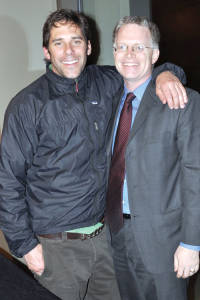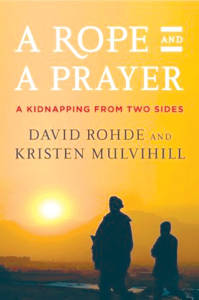FA grad talks about time in captivity
By Wayne E. Rivet
Staff Writer

MEETING UP WITH OLD CLASSMATES — Fryeburg Academy grad and New York Times reporter David Rohde (right) had a chance to meet up with old classmates such as Bond MacGillivray following his talk at the Leura Hill Eastman Performing Arts Center. (Photo by Rachel Damon)
FRYEBURG — As kidnapped journalist David Rohde sat amidst armed Taliban guards inside an unknown location in Pakistan, he frequently thought about three things.
He wondered if the Taliban extremists would kill him if their ransom demands — $25 million and 15 prisoners released from a Cuban detention center — were not met.
He questioned his own ethics. David felt he had been somewhat reckless in his attempt to schedule an interview with a Taliban commander as part of a book he was writing, which resulted in his capture. He also felt selfish, placing himself in harm’s way after being married just two months. He felt guilty about the worry and burden he had caused his wife, Kristen Mulvihill, who is a picture editor for Cosmopolitan magazine.
With uncertainty constantly hanging over his head, Rohde maintained a sense of hope by thinking of his two families — his own and his “Academy†family.
A Pulitzer Prize winner and an investigative reporter for The New York Times, Rohde told Fryeburg Academy students Monday at the Leura Hill Eastman Performing Arts Center that the values he learned at the school and fond high school memories he continues to cherish were essential elements that helped him survive seven months of captivity.
“Lessons learned here at Fryeburg Academy have helped me throughout my life, including that time of captivity,†said Rohde, a 1985 graduate. “These values will serve you the rest of your lives….They will serve you well in whatever you do in life.â€
When David’s family moved to Center Lovell, he enrolled at Fryeburg Academy. When his dad was forced to move due to business, David stayed at FA — first as a dorm student and later he was taken in by various local families.
His first taste of journalism came as editor of the “Raider Digest,†now known as the “Raider Review.†Those little “lessons†learned included: be honest, take responsibility for your actions, admit your mistakes, and treat others as you would like to be treated.
Rohde pointed to how “small the world has become,†citing the number of Mainers he met serving in the military and stationed in Afghanistan while covering events there for The New York Times (he once considered joining the military or becoming a paramedic after Sept. 11, 2001, but instead gave readers a close-up look at the happenings in Afghanistan through his newspaper accounts).
He told the audience how he looked forward to speaking with FA student Shafiqullah Mujadadi (known as “Shafiâ€), who comes from the village where he was abducted in November 2008.
The abduction
In writing a book about America’s failed attempts to stabilize Afghanistan since 2001, Rohde returned there to gather material for the final chapters. Others, who had written books about the conflict, had interviewed Taliban leaders. Naturally, Rohde thought he had to follow suit. Others had successfully conducted such interviews without incident.
Rohde wasn’t so lucky.
“My competitive side got the best of me. I rushed into it. I was too ambitious,†he told FA students. “I made a selfish decision. I didn’t tell her (my wife) that I was going to interview a Taliban commander. I didn’t think of the possible consequences of my actions.â€
An Afghan journalist arranged the interview. When Rohde, the journalist and a young Afghan driver arrived at the meeting spot, the commander wasn’t there. A call was made to the commander, and the men were told to travel farther down the road. When their vehicle turned a corner, the roadway was blocked. Two armed men approached the vehicle. Rohde and his two traveling companions were forced to the back seat, while the two gunmen occupied the front seat. The men were militants, who worked along with the Taliban and Al Qaeda fighters.
“The kidnapping occurred about a week after Obama was elected,†Rohde said. “When I told them I was an American, they raised their fists into the air and said they were going to send a blood message to Obama.â€
Blindfolded with scarves, the men were moved from various buildings several times, since the captors believed Americans were likely in pursuit. Eventually, the three kidnapped men arrived in a tribal area in Pakistan.
[stextbox id="info" float="true" width="350"]
The Rohde File
• A 1985 graduate of Fryeburg Academy.
• Attended Bates College, and later transferred to Brown University, where he earned a Bachelor of Arts degree.
• Worked as a county and municipal reporter for The Philadelphia Inquirer and later joined The Christian Science Monitor, covering national news and later became the paper’s Eastern European correspondent.
• Joined The New York Times in 1996.
• Won the Pulitzer Prize in 1996 for his “persistent on-site reporting of the massacre of thousands of Bosnia Muslims in Srebrenica,†a town in eastern Bosnia. He located eyewitnesses to the massacre and wrote about the events that led up to the slaughter. He was held captive in the Serb-held town of Bijeljina for 10 days. He was intensely interrogated, and was to be sentenced for spying before he was released.
• In 2008, he was part of The Times’ team coverage of Afghanistan and Pakistan, which received a Pulitzer Prize.
• Co-author with his wife, the couple penned, “A Rope and a Prayer: A Kidnapping from Two Sides,†their accounts of David’s kidnapping and Kristen’s efforts to free her husband.
• Today, David Rohde remains an investigative reporter for The New York Times.
[/stextbox]
The captors placed their ransom request, but weeks and months passed without any resolution. Back home, Rohde’s wife and family asked The Times to keep the kidnapping out of the press, fearing increased publicity would drive up the captors’ asking price. Eventually, the price dropped to $7 million and four prisoners.
While Rohde described the guards as “poorly educated,†they were, however, “technically savvy.†They “Googled†David Rohde on the Internet, and learned that his brother owned his own business. They misconstrued what Rohde’s brother does, believing he manufactures jumbo jets — thus the family had plenty of money to pay the ransom.
“I was never beaten. I even received bottled water and received English copies of a Pakistani newspaper,†Rohde said.
The captives watched numerous videos including American war movies such as “Windwalkers†and “Band of Brothers.†They would sing along with the guards after dinner. Rohde introduced his captors to “New York, New York,†“Born to Run†by Bruce Springsteen and “Imagine†by John Lennon.
“The guards even had a copy of an American video game, ‘Delta Force.’ Even though in the game they were Americans, they liked to shoot down the American helicopters,†he recalled.
To “humanize†himself to the guards, Rohde often talked about people he knew in Maine, describing them as hard-working, honest people.
Rohde saw the type of extremist culture that is emerging in some parts of Pakistan. When talking to an elementary student, Rohde asked want he wanted to be when he grew up? The answer: a suicide bomber. When he rephrased the question, adding that if peace is restored, what would he want to be? The answer changed slightly — a holy warrior.
Seeing no change in their situation, Rohde and the Afghan journalist decide to escape. On June 20, 2009, the two men successfully evaded their captors.
“We kept the guards up late that night playing Parcheesi,†he said.
Good fortune helped the escape effort. Power had been restored, that enabled the guards to run a cooling fan, which created some background noise. The young Afghan driver refused to take part in the escape. So, Rohde and the journalist reached the rooftop, and used a rope that Rohde had secretly hidden to lower themselves 15 feet over the wall to the compound. Their destination was a nearby Pakistani military base.
Suddenly, the men heard shouts to stop. They could also hear assault rifles being loaded. They raised their hands into the air.
“We had our hands in the air for 15 minutes. We were then told to take off our shirts,†Rohde said.
Inside the base, the men were finally safe. An officer allowed Rohde to make a phone call. He called home.
“At first, the answering machine picked up,†said Rohde. Then, he heard a woman’s voice, it was his mother-in-law who had moved from Kennebunkport to stay with David’s wife during the ordeal. Rohde informed her about the successful escape. The news was relayed to the FBI and other federal agencies. Two hours later, two helicopters swooped in and flew Rohde to safety.
“The first call I made was to my mother. She told me she loved me, and then said she was revoking my passport,†he said.
Again, Rohde reminded FA students about values.
“Don’t give up. For seven months, I felt my situation was hopeless. I knew the situation could change overnight. Be patient. Be determined. Don’t complain. Things will play out in ways you’ve never dreamed.â€
Rohde spoke of the importance of venturing into troubled areas of the world to file firsthand accounts of the events of each day while also speaking with the people (he called it “ground truthâ€) whose lives were being affected — and not simply relying upon governmental news releases. Journalism, Rohde told students, was a key that unlocked the door to see 30 different countries and a chance to report upon a wide range of topics.
When asked by one FA student if he thought peace is possible in Afghanistan, Rohde said he remains “optimistic.â€
Another student asked how he would feel if his daughter someday became a journalist and wanted to enter dangerous regions, as her dad once did. Rohde said he would encourage her to follow her dream.
He closed the talk saying, “You will always remember this place (Fryeburg Academy). The friendships. The lessons learned.â€
David Rohde remembered them during the darkest time of his life.



